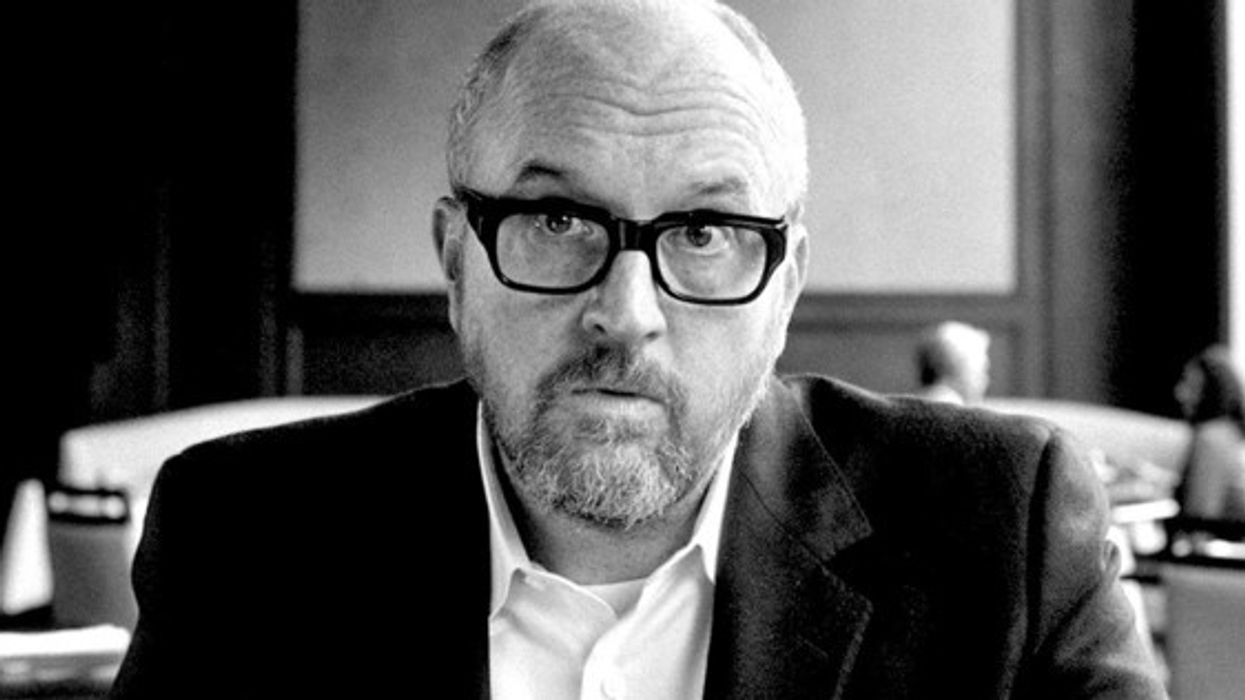Louis C.K. Whips Out the Story Behind His Polarizing, DIY Film 'I Love You Daddy'
Louis C.K. shares his own words on the movie everyone is talking about.

I Love You, Daddy would be a controversial film no matter how it came about. The story of a successful TV writer whose teenage daughter is seduced by a legendary filmmaker is edgy enough on its own, but given that the self-financed, black and white film was directed (and edited) in secret by one of the most famous and controversial comedians around, it's no wonder everyone is looking to talk to Louie, including the TIFF Long Take podcast. Here's a few things we learned about C.K.'s career and the motivations behind I Love You, Daddy during a live recording of a conversation with C.K. during TIFF 2017.
Third Time's the Charm?
Many people think that C.K.'s debut behind the camera was Pootie Tang, the 2001 cult classic that the A.V. club describes as "Dolemite meets The Last Dragon meets the Zucker brothers meets Jean-Luc Godard, and everything the hero says is complete gibberish," which is a pretty fair assessment of the film, a ridiculously absurd super-hero movie that almost ended his career in Hollywood (more on that below). But at TIFF, C.K. revealed that he had actually directed another film, a black and white 16mm feature about "the morose owner of a camera store" that he made in 1998 with his own money. It's available to watch on his website.
He dutifully took the film off to Sundance, where, he remembers, "seven people came [to the screening]. Literally. I counted seven people. And that was my shot, I got one screening...I went back to work."
Master of All
When he made Pootie Tang, which started out as a Paramount Classics film before it ended up a $7 million dollar production, C.K. was determined to keep complete and total control of the project. His strategy? The budding auteur decided, "I'm only going to shoot masters of everything, so they can never change the movie. So there was a guy who was tasked with saying, 'Don't you wanna get more closeups?" C.K., no surprise, roundly avoided this unnamed Paramount employee, until finally, the two of them ended up in producer John Goldwyn's office and were bawled out, C.K. for his truculence, and the executive for failing to get the coverage that the studio wanted from the director.
Today, he looks at the film, wrenched from his hands by the studio, extensively re-edited, and tossed out to the box office where it earned less than half of its budget back, as a "formative" education, though he says the film in its current form is "nothing I identify with...[but] it wasn't good the way I had it either." But some good did come from the debacle.
Creative Control
In the years following his studio debacle (and later, underground "secret success"), C.K.'s career took off, and, against all odds, he began to get control of projects, culminating with his hit Louie on FX, the first time he had total say. Today, C.K. says that his studio outing taught him some valuable lessons. "You've got to consider everyone's motivations and their pressures," he said. "When I made Pootie Tang, what I really learned wasn't that the studios are horrible and vicious, and I must find my own way. What I found was, I'm an asshole, and I don't think of other people enough."
"I'm only going to shoot masters of everything, so they can never change the movie." —C.K., on Pootie Tang
Citing the reason for self-financing I Love You, Daddy, he said that beyond control over the project, he has, "what I think are some pretty bad ideas, and I don't want to drag anyone else into it." He gave a little more insight into his thinking when he discussed the way he was able to secure his cast, and how he looks at the capital that fame has given him. "The one value that has is access to talent that I wouldn't otherwise have." He can thus work with people that he likes while avoiding the system of gatekeepers and agents in Hollywood, and indeed, the film features stars like John Malkovich and Chlöe Grace Moretz.
C.K. revealed that "talented actors, who have taste and want to do great projects, sometimes their representatives will very aggressively keep you away from them, because they don't want you to do the good shit, because it usually doesn't pay as much money. They would rather [their clients] go and make Superman 14."
Today, he looks on the ability he has to do things his way as a "responsibility," and is grateful to be in the position he's in, even if it's at the center of a storm. C.K. has said that the film, which does not yet have a release date, is about the "the fact that you really can never know anybody," and it seems safe to say that people will be trying to get to know Louis C.K. and his movie for the foreseeable future.
Watch the whole discussion here.
See all of our coverage of TIFF 2017.
Source: TIFF Long Take

 'Anora'Neon
'Anora'Neon Annie Johnson Kevin Scanlon
Annie Johnson Kevin Scanlon









